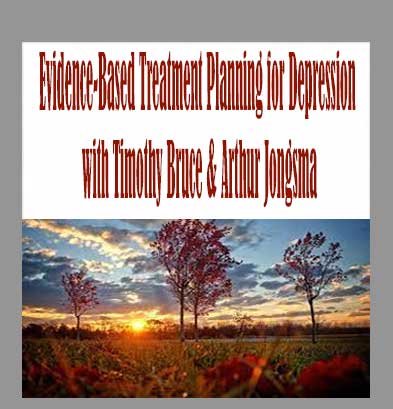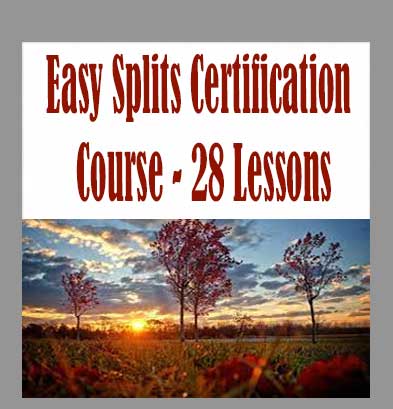Description
Evidence-Based Treatment Planning for Depression with Timothy Bruce & Arthur Jongsma download , Evidence-Based Treatment Planning for Depression with Timothy Bruce & Arthur Jongsma review , Evidence-Based Treatment Planning for Depression with Timothy Bruce & Arthur Jongsma free
Evidence-Based Treatment Planning for Depression with Timothy Bruce & Arthur Jongsma
Learn everything you need to know about creating detailed, practical evidence-based treatment plans for depressed clients in this one-of-a-kind video with Drs. Timothy Bruce and Arthur Jongsma, who present an overview and accompanying demonstrations of depression’s most empirically supported treatment methods.
Today’s clinicians are increasingly required to submit clear, standardized treatment plans for clients’ presenting problems—but what these plans actually look like hasn’t been as clearly defined. If you’ve been wondering what, exactly, comprises such a plan or have searched for resources on the empirically supported treatments on which these plans are based, you’ll find answers in this new video with Drs. Timothy Bruce and Arthur Jongsma. Here, the two seasoned clinicians focus on depression as they offer the essential elements of evidence-based treatment planning.
Bruce and Jongsma begin with a clinical review of depression and the features of a major depressive episode (MDE), as outlined in the DSM. Moving at a fast clip, they distinguish between the four major types of mood episodes, expand on the relationship between mood episodes and mood disorders, and offer tools for distinguishing and remembering the criteria of an MDE. You’ll also gain a solid understanding of their six-step treatment planning process, with an emphasis on building a plan informed by the latest empirically supported treatments (ESTs).
Theories, approaches, and interventions abound as the clinicians outline both the “well-established” and “probably efficacious” treatments, describing six of the former in detail. A brief history of the EST movement provides further clinical context.
You’ll find sample treatment plans here, along with expert commentary on the most researched ESTs. Through a series of live demonstrations with a depressed woman named Maria, you’ll watch her therapist bring her to new insights and adaptive behaviors using cognitive restructuring, interpersonal skills training, behavioral activation, and other proven interventions. Definitions, goals, and relapse prevention are covered, too—but as Bruce and Jongsma show, the methods are only effective within the context of an empathic therapeutic relationship.
Look no further than this new video for a comprehensive education that you can immediately use to support client growth, satisfy professional requirements, and build clinical confidence.
WHAT THERAPISTS ARE SAYING…
“…The best introduction to evidence-based treatment for panic disorder, social anxiety disorder, and depression available. The treatments are presented in a clear and straightforward manner. I highly recommend this to anyone wanting to teach themselves to use these treatments, as well as teachers, professors, or lecturers looking for training materials for students and beginning therapists in this area.”
— William C. Sanderson, PhD, Professor of Psychology, Hofstra University
In Depth
Clinicians are overwhelmed these days by an ever-increasing number of psychological approaches and ever-stricter requirements affecting treatment planning. Knowing which of the many approaches qualify as evidence-based, or how to translate their interventions into a coherent, phase-oriented plan, can be challenging. The prevalence of depression as a clinical diagnosis, furthermore, makes standardized treatment planning a necessity for many mental health professionals, yet resources for learning to do so are hard to come by. We’re excited to offer this new, in-depth video, in which two clinical experts break down and demonstrate the crucial components of an evidence-based treatment plan for depression.
After giving an overview of the DSM criteria for depression and the history of the empirically supported treatment (EST) movement, Bruce and Jongsma outline the criteria for both “well-established” and “probably efficacious” treatments, going on to describe six of the former methods in detail. With a rundown of these approaches that includes review, demonstration, and commentary, you’ll learn how to compose a six-step treatment plan based on the interventions of behavioral activation, cognitive restructuring, personal and interpersonal skills training and problem-solving therapy, and interpersonal therapy. You’ll also learn about other common approaches to treatment, as well as relapse prevention.
If you’re looking to deepen your understanding of evidence-based treatment planning and the empirically supported treatments on which they’re based, be sure to add this information-packed video to your library.
By watching this video, you will:
- Refresh your knowledge of the DSM criteria for depression and the features of a major depressive episode.
- Learn to create a six-step treatment plan based on well-established evidence-based empirically supported treatments.
- Understand the common considerations in depression relapse prevention and how to address them with your clients.
Specs
Length of video: 00:53:56
English subtitles available
Bios
Timothy Bruce, PhD, is Professor and Associate Chair of the Department of Psychiatry and Behavioral Medicine. A summa cum laude graduate of the honors program curriculum at Indiana State University, Bruce received his Ph.D. in Clinical Psychology from The University at Albany-State University of New York under the mentorship of Dr. David Barlow. He completed his residency training at Wilford Hall USAF Medical Center under the direction of Dr. Robert Klepac.
Bruce is active in the clinical, educational, and scholarship missions of the department. He serves several administrative positions in the department including Associate Chair, Director of Medical Student Education, and Director of the Psychiatry Residency Scholarship Program. Bruce’s contributions to the literature include over 30 books and training manuals, as well as numerous professional journal articles, book chapters, encyclopedia articles, and other works. His areas of interests include education and training, the evidence-based practice of clinical psychology, and cognitive behavioral therapies. In addition to maintaining his own clinical practice, Bruce supervises the psychotherapy training of residents. Recognized for his work in academic administration as well as classroom and clinical teaching, Bruce has received over three dozen awards for his efforts in these areas to date.
Most recently, Bruce has been contributing editor and co-author of Arthur Jongsma’s widely used PracticePlanners© Series, empirically informing it with results from the psychotherapy outcome literature.
ARTHUR E. JONGSMA, Jr., PhD, is Series Editor for the bestselling PracticePlanners® . Since 1971, he has provided professional mental health services to both inpatient and outpatient clients.
Frequently Asked Questions:
- Innovative Business Model:
- Embrace the reality of a genuine business! Our approach involves forming a group buy, where we collectively share the costs among members. Using these funds, we purchase sought-after courses from sale pages and make them accessible to individuals facing financial constraints. Despite potential reservations from the authors, our customers appreciate the affordability and accessibility we provide.
- The Legal Landscape: Yes and No:
- The legality of our operations falls into a gray area. While we lack explicit approval from the course authors for resale, there’s a technicality at play. When procuring the course, the author didn’t specify any restrictions on resale. This legal nuance presents both an opportunity for us and a boon for those seeking budget-friendly access.
- Quality Assurance: Unveiling the Real Deal:
- Delving into the heart of the matter – quality. Acquiring the course directly from the sale page ensures that all documents and materials are identical to those obtained through conventional means. However, our differentiator lies in going beyond personal study; we take an extra step by reselling. It’s important to note that we are not the official course providers, meaning certain premium services aren’t included in our package:
- No coaching calls or scheduled sessions with the author.
- No access to the author’s private Facebook group or web portal.
- No entry to the author’s exclusive membership forum.
- No direct email support from the author or their team.
We operate independently, aiming to bridge the affordability gap without the additional services offered by official course channels. Your understanding of our unique approach is greatly appreciated.
- Delving into the heart of the matter – quality. Acquiring the course directly from the sale page ensures that all documents and materials are identical to those obtained through conventional means. However, our differentiator lies in going beyond personal study; we take an extra step by reselling. It’s important to note that we are not the official course providers, meaning certain premium services aren’t included in our package:
Refund is acceptable:
- Firstly, item is not as explained
- Secondly, Item do not work the way it should.
- Thirdly, and most importantly, support extension can not be used.
Thank you for choosing us! We’re so happy that you feel comfortable enough with us to forward your business here.








Reviews
There are no reviews yet.